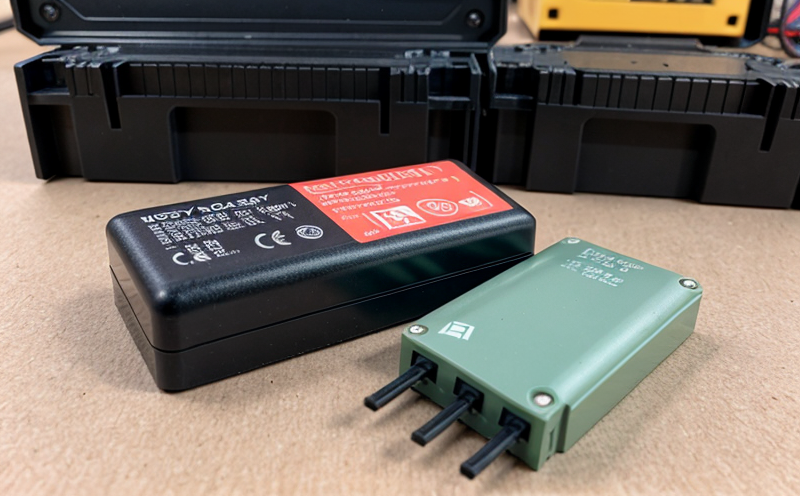UL 1973 Battery Modules for Stationary Energy Storage Performance Testing
The UL 1973 standard is a critical benchmark in the industry for evaluating the safety and performance of battery modules intended for stationary energy storage systems. This testing ensures that these batteries meet rigorous requirements set by Underwriters Laboratories (UL), thus guaranteeing their suitability for use in grid-scale applications, residential installations, and other stationary storage settings.
Stationary energy storage systems are designed to provide backup power during outages or to smooth the output of renewable energy sources. The UL 1973 testing process focuses on ensuring that battery modules perform reliably under a wide range of conditions, from extreme temperatures to varying loads. This comprehensive evaluation helps prevent failures and hazards associated with improper charging, discharging, or storage.
The testing protocol for UL 1973 is designed to simulate real-world scenarios where batteries are subjected to various stresses. These tests include cycle life testing, overcharge/overdischarge testing, deep discharge testing, and temperature cycling. Each of these tests provides critical data that helps manufacturers and users understand the performance limits and capabilities of their battery modules.
For quality managers and R&D engineers involved in stationary energy storage projects, this service is essential for ensuring compliance with industry standards. By adhering to UL 1973 guidelines, companies can demonstrate a commitment to safety and reliability, which is crucial for gaining market acceptance and regulatory approval.
The testing process involves detailed specimen preparation, where each battery module undergoes rigorous conditioning prior to the start of performance tests. This ensures that all modules are in a consistent state before being subjected to various stress conditions. The use of advanced instrumentation allows for precise monitoring of key parameters such as voltage, current, temperature, and internal resistance during testing.
The results from UL 1973 testing provide comprehensive data on the performance characteristics of battery modules. This information is invaluable for quality managers in optimizing production processes and improving product design. Compliance officers can use these test results to ensure that their company’s products meet all relevant safety and performance standards, thereby reducing the risk of recalls or legal issues.
R&D engineers benefit from UL 1973 testing by gaining insights into how different variables affect battery module performance. This knowledge can lead to innovations in battery technology and improvements in energy storage systems. For procurement teams, this service ensures that they are sourcing high-quality components for their projects, thereby enhancing the overall reliability of the final product.
Why Choose This Test
Selecting UL 1973 Battery Modules for Stationary Energy Storage Performance Testing offers several compelling advantages. Firstly, it ensures that battery modules meet the strictest safety and performance standards set by an internationally recognized organization like Underwriters Laboratories (UL). This certification enhances market credibility and trust among consumers and stakeholders.
- Compliance with International Standards: Adherence to UL 1973 guarantees compliance with international standards, which is crucial for export markets where regulatory requirements vary widely.
- Risk Mitigation: By identifying potential issues early in the development or production process, this testing helps mitigate risks associated with product failures and recalls.
- Enhanced Product Reputation: Successfully passing UL 1973 tests can significantly enhance a company’s reputation for quality and reliability, making it more attractive to investors and partners.
In addition to these benefits, this testing service offers detailed insights into the performance characteristics of battery modules. This information is invaluable for continuous improvement in product design and manufacturing processes. Moreover, compliance with UL 1973 can streamline the approval process for new products, reducing time-to-market by eliminating unnecessary regulatory hurdles.
International Acceptance and Recognition
The UL 1973 standard enjoys widespread international recognition, particularly in regions where grid-scale energy storage systems are becoming increasingly important. Countries like the United States, Canada, Europe, and Australia have adopted this standard as a benchmark for evaluating battery modules used in stationary applications.
- United States: UL 1973 is widely accepted by utilities, integrators, and installers within the U.S., ensuring that products meet stringent safety requirements.
- Canada: Similar to the U.S., Canada relies on this standard for evaluating stationary energy storage systems. Compliance with UL 1973 enhances market access for Canadian manufacturers.
- Europe: While not mandatory, compliance with UL 1973 is highly valued by European regulators and customers. It demonstrates a commitment to safety and reliability in line with EU directives on renewable energy and smart grids.
In addition to these key regions, many other countries have either adopted or are considering adopting UL 1973 as the standard for stationary energy storage systems. This international acceptance underscores its importance in shaping industry practices globally.
Use Cases and Application Examples
The applications of UL 1973 Battery Modules for Stationary Energy Storage Performance Testing are extensive, spanning various sectors that rely on reliable and safe energy storage solutions. Here are some notable use cases:
- Utility-Scale Solar Farms: By integrating battery modules that meet UL 1973 standards, solar farms can ensure efficient grid support during peak demand periods.
- Rooftop PV Systems: Homeowners and small businesses benefit from UL 1973 compliant batteries by gaining reliable backup power during outages or to supplement renewable energy generation.
- Data Centers: The consistent performance of battery modules ensures uninterrupted power supply, critical for maintaining data integrity in these high-reliability environments.
- Hospitals and Critical Infrastructures: Hospitals and other essential services rely on UL 1973 certified batteries to provide reliable backup power during emergencies.
Beyond these applications, the testing ensures that battery modules are suitable for a wide range of stationary storage systems. This includes hybrid electric vehicles (HEVs), uninterruptible power supplies (UPS), and other devices where reliability is paramount.





